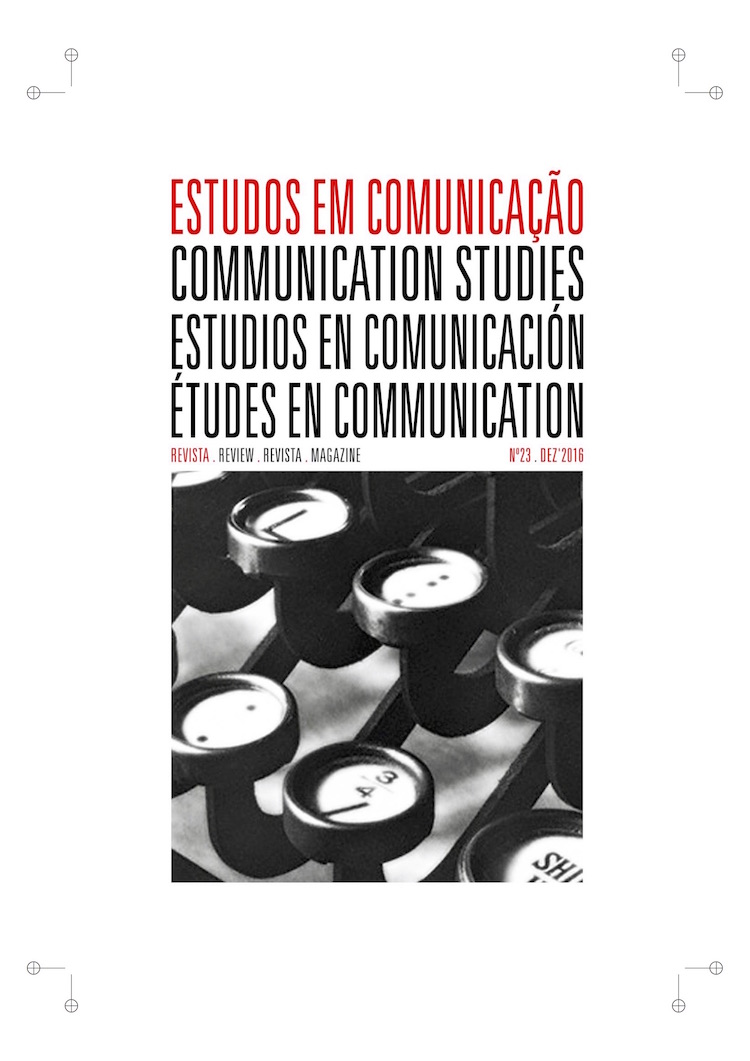O Estado da Arte da Comunicação Organizacional
Resumo
A investigação em comunicação organizacional tem vindo a crescer nos últimos anos e a constituir-se como uma necessidade premente para a compreensão da dinâmica e do comportamento organizacional. Porém, o investimento nesta área de estudo e o entendimento da sua complexidade implica a identificação de um percurso histórico e das linhas de investigação que lhe são inerentes. O presente trabalho, tem como principal objetivo revisitar as diferentes linhas de investigação e os respetivos paradigmas que, historicamente, têm atravessado a investigação em comunicação organizacional até aos nossos dias. Nesse sentido, serão identi- ficados e explicitados os quatro paradigmas principais associados à comunicação organizacional, sendo estes: o paradigma positivista; o paradigma interpretativo; o paradigma crítico e o paradigma dialógico. Esta discussão – praticamente inexistente na literatura, torna-se fundamental não só para percebermos o contexto histórico da comunicação organizacional, mas também para elevarmos o estado de maturidade da disciplina providenciado uma perspetiva integrada da mesma.
Referências
Alvesson, M. & Ashcraft, K. L. (2009). Critical methodology in management and organizational research. In D. A. Buchannan & A. Bryman (Eds). The sage handbook of organizational research methods (pp. 61-77). Los Angeles, CA: Sage Publications.
Ashcraft, K. L. & Mumby, D. K. (2004). Reworking gender: a feminist com- municology of organization. Thousand Oaks, CA: Sage Publications.
Blair, R.; Roberts, K. & McKecnie, P. (1985). Vertical and network communi- cations in organizations: the present and the future. In R. D. McPhee & P. K. Tompkins (eds). Organizational communication: traditional themes and new directions (pp. 55-77). U.S.A: Sage Publications.
Bouzon, A. (2013). Theoretical approaches in organizational and strategic communication: a review of the french academic literature. In G. Gon- çalves, I Somerville & A. Melo (eds). Organizational and strategic com- munication research: european perspetives (pp. 23-45). Covilhã: Livros Labcom.
Deetz, S. (2001). Conceptual foundations. In F. M. Jablin & L. L. Putnam (Eds). The new handbook of organizational communication: advances in theory, research and methods (pp. 3-46). Thousand Oaks: Sage Pu- blications.
Jones, E.; Watson, B.; Gardner, J. & Gallois, C. (2004). Organizational com- munication: challenges for the new century. International Communica- tion Association, 54: 722-750.
Krone, K. (2007). Trends in organizational communication research: sustai- ning the discipline, sustaining ourselves. Communication Studies, 56 (1): 95-105.
Miller, K. (2001). Quantitative research methods. In F. M. Jablin & L. L. Putnam (Eds). The new handbook of organizational communication: ad- vances in theory, research and methods (pp. 137-160). Thousand Oaks: Sage Publications.
Miller, K. (2012). Organizational communication: approaches and processes. Boston: Wadsworth, Cengage Learning.
Mumby, D. (2001). Power and politics. In F. M. Jablin & L. L. Putnam (Eds). The new handbook of organizational communication: advances in theory, research and methods (pp. 585-623). Thousand Oaks: Sage Publications.
Mumby, D. K. & Stohl, C. (1996). Disciplining organizational communica- tion studies. Management Communication Quarterly, 10: 50-72.
Oliveira, E. & Ruão, T. (2013). Os quatro paradigmas da comunicação es- tratégica e o ensino em Portugal. Atas do VIII Congresso da SOPCOM. Lisboa: Escola Superior de Comunicação Social – Instituto Politécnico de Lisboa.
Putnam, L. & Pacanowsky, M. (eds) (1983). Communication and organizati- ons: an interpretative approach. Beverly Hills, CA: Sage Publications.
Redding, C. (1985). The emergence of organizational communication as a field of study. In R. D. McPhee & P. K. Tompkins. Organizational com- munication: traditional themes and new directions (pp. 15-54). U.S.A: Sage Publications.
Redding, C. & Tompkins, P. (1988). Organizational communication: past and presente tenses. In G. M. Goldhaber & G. A. Barnett (eds). Handbook of organizational communication (pp. 5-33). Norwood: Ablex Publishing.
Ruão, T. (1999). A Comunicação organizacional e a gestão de recursos huma- nos: evolução e actualidade. Cadernos do Noroeste,12(1-2): 179-194.
Ruão, T. (2004). O estado da arte em comunicação organizacional. 1900- 2000: um século de investigação. Atas do III Congresso da SOPCOM, VI LUSOCOM e II Ibérico. Covilhã: Universidade da Beira Interior.
Ruão, T. (2008). A Comunicação organizacional e os fenómenos de identi- dade: a aventura comunicativa da formação da Universidade do Minho, 1974-2006. Tese de Doutoramento, Universidade do Minho, Braga, Por- tugal.
Schockley-Zalabak (2012). Fundamentals of organizational communication: knowledge, sensitivity, skills, values (8o ed). Colorado: Pearson Educa- tion.
Spence, P. R. & Baker, C. R. (2007). State of the method: examination of levels of analysis, methodology, representation and setting in current or- ganizational communication research. Journal of the Northwest Commu- nication Association, 36: 111-124.
Taylor, B. & Trujillo, N. (2001). Qualitative research methods. In F. M. Jablin & L. L. Putnam (Eds). The new handbook of organizational communica- tion: advances in theory, research and methods (pp. 161-196). Thousand Oaks: Sage Publications.
Taylor, J. (1993). Rethinking the theory of organizational communication: how to read an organization. New Jersey: Ablex Publishing.
Wrench, J. S. (2013). Communicating within the modern workplace: chal- lenges and prospects. In J. S. Wrench (Ed). Workplace communication for the 21st Century: tools and strategies that impact Bottom line. CA: Praeger.
Wrench, J. & Punyanunt-Carter, N. (2012). An Introduction to organizational communication. U.S.A: Sage Publications.
Yanow, D. & Ybema, S. (2009). Interpretivism in organizational research: on elephants and blind researchers. In. D. A. Buchannan & A. Bryman (Eds). The sage handbook of organizational research methods (pp. 39- 60). Los Angeles, CA: Sage Publications.


